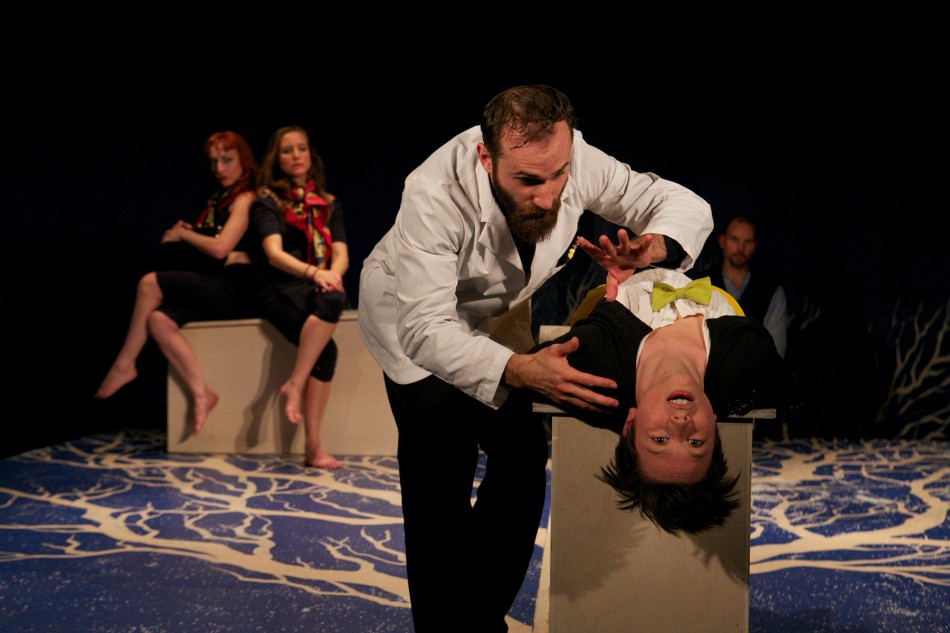By Beatrice Williams-Rude
The Potomac Theatre Project’s NYC season is underway at the Atlantic Theatre 2. Included is a double feature: “Judith: A Parting from the Body,” by Howard Barker and “Vinegar Tom,” by Caryl Churchill. These are works for thinking people, for those who enjoy analyzing and seeing parallels, for those with a knowledge of and interest in history. These are not pleasant plays although they are intellectually exciting. Below is a review of the second half of the double feature.
The Witches of Essex
“Vinegar Tom,” an impassioned play by Caryl Churchill deals with the witch trials in England in the 17th century. The title refers to a pet cat, thought to be the “familiar” of its owner.
While the focus is on the factors leading to a woman’s being charged with witchcraft, the subtext is the treatment of women and the options open to them at this time.
An elegant young woman of means, who has refused to marry, is bled by a doctor to, in effect, restore her sanity. Later she’s told to marry a rich man and she’d have a good life. She’d have a fine home and want for nothing. Her husband would have a mistress and thus would largely leave her in peace. To marry a less affluent man meant having to work all day and possibly being beaten. (A good marriage was one in which the husband didn’t beat his wife.)
Women who had sex outside of marriage were in an equally difficult position. They could be discarded, mistreated, then accused of anything that came to the former lover’s head, including witchcraft, the excuse for his own carnal behavior..
“Cunning women,” healers with knowledge of the medicinal effects of herbs, sometimes considered “good” witches, frequently provided abortifacients to women who had unwanted pregnancies. Discovery could lead to death sentences for both women. (The struggle for abortion rights has been demonstrably long and dangerous.)
We are introduced to numbers of women, some accused of witchcraft, some the accusers, and the men who abuse them in various ways. There is a commercial element at work as well. When crops were poor, or animals died the cry went up that it was witchcraft.
I am reminded of a play by A.J. Taylor, “Good,” about how far people will bend the truth in order to claim they are good; in this case, people who’d been lured into the Nazi party, the “good Germans.” In Caryl Churchill’s play it’s a couple who “sacrifice a calf” by burning it alive, to prove they are God-fearing and good. When the farmer, whose fields are fallow, whose animals are sick and who has become impotent asks why God would inflict such misery on him, given that he is “good,” he and his wife conclude that it’s not God, but rather the Devil. So the witch-hunt begins.
The torture devices that were used to make the accused “confess” are described in agonizing detail—boots that crushed bones, and sleep deprivation among them. (Sleep deprivation was used as a means of slow execution by the Romans, yet headlines this week show the C.I.A. still uses it, with the connivance of The American Psychological Association.)
This wrenching play must be considered Caryl Churchill’s crie du coeur.
The splendid director is Cheryl Faroane. The in-your-face songs are by Carol Christensen, who is also the music director. Sound by Aubry Dube, costumes by Annie Ulrich. Scenic design by Hallie Zieselman.
The uniformly excellent cast consists of: Tara Giordano, Bill Army, Kathleen Wise, Lucy Faust, Nesba Crenshaw, Chelsea Melone, Caitlin Meagher, Steven Dykes, Patricia Buckley, Madeley Crenshaw-Dykes. The singers are: Caitlin Rose Duffy, Joelle Mendoza and Liana Barron.
The play will run through August 9 at the Atlantic Theatre 2, 330 West 16th Street, in Manhattan.
,Photos:Stan Barouh























